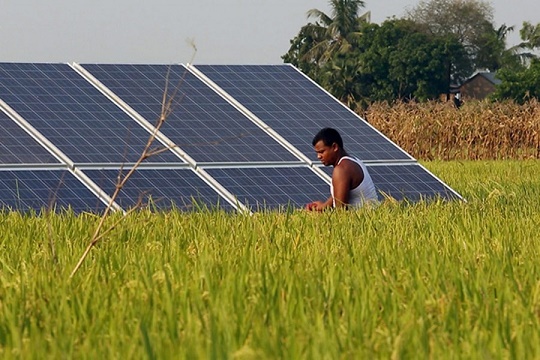Production cost per unit
India: Tk 5.81
Pakistan: Tk 3.81
Bangladesh: Tk 14.30-22.38
Experts believe that Bangladesh has good potential for solar power as there is sunshine most of the year. However, the cost of generating electricity from solar power plants in the country is 3-4 times higher than neighboring India and Pakistan. Although the production cost of solar power has decreased gradually over the last decade in the world, the situation is different in Bangladesh. The pressure of increased production costs is falling on the entire power sector, including the Bangladesh Power Development Board (BPDB).
According to media report citing BPDB, currently the cost per unit of solar power generation in Bangladesh ranges from Tk14.30 to Tk22.38. On the other hand, according to data from renewable energy organization Change Initiative, the cost of generating electricity from solar power plants in India is on average Tk5.81 in Bangladeshi currency and Tk3 in Pakistan. 51. The concerned officials of the electricity department said, due to the decrease in the prices of all types of components including solar panels in the global market, the purchase contracts of solar power are being made at a much lower price than before. As a result, it will be possible to get electricity from solar power at an affordable price in the coming days.
Experts said that due to intense competition in India's power sector, companies there can supply electricity at low prices. Due to the lack of competition in Bangladesh, the cost of solar energy is 3 times higher than in India. The government should create a competitive environment in solar power generation to bring down the price of electricity in the purchase agreement. Apart from this, they also suggested more policy support for land acquisition, construction of transmission infrastructure, and import of solar components.
According to a media report citing BPDB's last month (April 2024) electricity production cost report, electricity was generated from 10 solar power plants in the country in April. The highest-cost solar power plants include - Kaptai seven MW solar power plant in Chattogram (cost Tk 22.38 per unit), Sarishabari three MW solar power plants in Jamalpur (Tk 20.87), Sutiakhali 50 MW solar power plant in Mymensingh (Tk18.70), Lalmonirhat 30 MW Solar Power Plant (Tk17.60), the country's largest Gaibandha 200 MW Solar Power Plant (Tk16.50).
Tetulia 8 MW solar power plant has the lowest cost in the country for solar power generation. Their production cost per unit is Tk14.30, which is much lower than the highest cost of ‘Kaptai Seven MW Solar Power Plant’. And the government is buying electricity from solar power plants on 'no electricity, no payment' terms. For this reason, there is no capacity charge in the case of these power plants.
In this regard, Md Zakir Hossain Khani, a renewable energy expert, and Chief Executive Officer of Change Initiative, said in an interview that the production cost per unit of solar-powered electricity in the country is 10 to 22 cents (Tk11 to Tk24), while according to the results of a survey conducted by Change Initiative, the ideal tariff for any solar power generation is Should be only 5 to 6 cents. The sole purpose of buying electricity at a price of about three to four times higher is illegal commission trading, the responsibility of which is being passed on to the customer. This is not only unethical but the opposite of the transition to green energy. Globally, environmentally friendly renewable electricity potential is being exploited through overpriced solar power generation. A competitive tariff on renewable energy that is not set soon could become a hindrance rather than an enabler to the development of a green economy.
Energy analyst Shafiqul Alam said that the main reasons for the high cost of production are the high cost of land, the complexity of land acquisition, the provision of self-financed transmission line construction by entrepreneurs, and the non-construction of power plants based on competition. Despite the promise of foreign investment, many entrepreneurs are unable to implement solar power projects due to inability to acquire land. As land acquisition in India does not face so many problems, projects are implemented very quickly there.
He said that the cost of solar power generation can be brought down from Tk7 to Tk8 if the power plant is done through competitive bidding along with reducing the cost of transmission infrastructure construction to the government. Otherwise, there will be a major impact on the country's average power generation cost in the future.
QA Sarhan Sadek, Deputy Director (Sustainable Energy & SDGs), Power Cell, said that entrepreneurs get free and low-cost land for solar power projects in India. The government is also making grid lines. But the entrepreneurs of Bangladesh have to buy land at a high price and build grid lines at their own expense. However, the prices of all types of parts including solar panels, inverters have decreased in the global market. Due to this, the tariff per unit is not more than Tk 10 to Tk 11 in the new contracts. The benefits of tariff reduction in the new agreement will be available in the future.
It should be noted that as per the Renewable Energy Policy-2008 and the Power System Master Plan (PSMP)-2016, the government had set a target of 10pc (percent) of total electricity generation from renewable energy by 2021. Lack of land was the major obstacle in achieving this goal. After the adoption of PSMP in 2016, the government has planned to implement a total of 67 solar park projects in the public and private sectors. A target of 4 thousand 15.66 MW electricity generations from grid connected solar parks has been set. So far only 11 solar park projects with a capacity of 536 MW have been implemented.
When the situation of the first phase is like this, the power department has undertaken a new ambitious plan. A target of 30pc of total electricity generation by 2030 and 40pc by 2041 from renewable sources and clean energy has been set.
People associated with the power department said, 3 acres of land is required to produce one megawatt of solar power. Along with that, efficient management is also needed for timely implementation of solar power projects. The head of government has ordered that no government or private project can be done on three-crop land. Mainly due to lack of land, the target of the first phase was not met.
According to the data of Power Cell, currently the power generation capacity in the country is 30 thousand 277 MW (including captive and renewable energy). Besides, 2 thousand 656 MW of import capacity has been created from India. According to the data of the Sustainable and Renewable Energy Development Authority (SREDA) on May 6, the total power generation capacity from renewable energy in the country is 1 thousand 303.26 MW. Out of this only solar power capacity is 1 thousand 69.27 MW.
ZH






